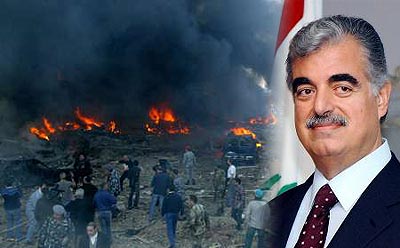 After testifying Tuesday at the Special Tribunal for Lebanon about Syria’s hegemony over Lebanon and revealed some the factors that led to the assassination of former Prime Minister Rafik Hariri in 2005, MP Marwan Hamadeh resumed on Wednesday his testimony before STL , focusing on the pressure that Syrian president Bashar al Assad exerted on the Lebanese leaders and specially Hariri to amend the constitution in order to renew the term of his ally former president Emile Lahoud.
After testifying Tuesday at the Special Tribunal for Lebanon about Syria’s hegemony over Lebanon and revealed some the factors that led to the assassination of former Prime Minister Rafik Hariri in 2005, MP Marwan Hamadeh resumed on Wednesday his testimony before STL , focusing on the pressure that Syrian president Bashar al Assad exerted on the Lebanese leaders and specially Hariri to amend the constitution in order to renew the term of his ally former president Emile Lahoud.
Renewal of Lahoud’s term
Hamadeh testified that he met in August 2004 with Hariri at the residence of Progressive Socialist Party chief Walid Jumblatt in Beirut’s Clemenceau immediately after the former PM returned to Lebanon from talks with Assad in Damascus.
Hamadeh quoted Hariri as being told by Assad: “We want Lahoud and no one else.”
Assad then threatened Hariri and told him: “I will destroy Lebanon on your head and the head of Walid Jumblatt. So it would be better for you to return to Beirut and fix things.”
Hamadeh testified that Jumblatt advised Hariri to avoid confrontation and respond positively to Assad’s threat and vote for the extension of Lahoud’s term, and then quit from the cabinet and leave Lebanon to preserve his dignity.
Hamadeh testified that he understood Assad’s threat to include” bombings, internal strife, assassinations, revenge operations and anything that had already been in the dictionary of the Syrian regime since 1975.”
Hamadeh testified that Hariri told him he would “send his response to Assad through Gen. Rustom Ghazali but didn’t tell us what his response would be.”
Hamadeh testified that Hariri believed relations with Syria should be corrected and that required the election of a new president and not a head of state who is completely submissive to the Syrian will.
In that regard Hamadeh told STL : “We were working on forming a strong opposition which could restrict what the Syrians and their allies in Lebanon wanted to impose on us.”
Hamadeh then testified about the cabinet meeting of August 28 that followed Hariri’s meeting with Assad
“Everyone in the cabinet knew that Hariri had come under pressure by Assad. During the 10-minute cabinet session there was total silence by all the supporters of the Syrian regime who wanted the constitutional amendment in order to renew Lahoud’s term.
At that point STL adjourned the meeting
Hamadeh resumed his testimony after the lunch break and continued to talk about the pressure exerted by the Syrian regime on Lebanse leaders:
“The Syrian pressure turned the Lebanese Foreign Ministry into a branch of the Syrian Foreign Ministry.” He said
He then addressed the issue of UN resolution 1559 and its implications on the Syrian regime and Hezbollah.
“There was a direct link between the extension of Lahoud’s term and the approval of resolution 1559”, he said and added:
“The international community sensed that Syria was pressuring Lebanese state institutions, instead of easing its grip on the country, in the buildup to the adoption of resolution 1559.
Hamadeh stressed that 1559 was basically the same as the Taef accord and was in fact meant to implement what the Taef didn’t .
“Resolution 1559, regardless of its interpretation by various forces in Lebanon, is identical to the Taef Accord and National Pact.” he said and stressed that Lebanese officials sought to implement the resolution through negotiations, mainly over Hezbollah’s disarmament, but the Pro-Syria media and officials in Lebanon waged a major campaign against resolution 1559.
He told the court that Hariri and Jumblatt sought to persuade international powers that Hezbollah can be disarmed through dialogue. They pressed for this stance in order to thwart foreign meddling in Lebanon.
Addressing the issue of the amendment to the constitution to facilitate the extension of Lahoud’s term , He said
“I believe that Hariri voted for the extension of Lahoud’s term in order to avoid disputes and tensions in Lebanon. He was probably secretly counting on creating a change in the upcoming parliamentary polls.” He said , on the other hand Jumblatt voted against the amendment and extending Lahoud’s term and spoke during the parliamentary session why he opposed the extension.
Hamadeh said that vote on the extension helped Hariri and his allies determine the number of MPs that actually opposed the extension.. He said after that some of these MPS were assassinated .
About 1559 resolution
United Nations Security Council resolution 1559 was adopted on 2 September 2004. The Council supported free and fair presidential elections in Lebanon and called upon Lebanon to establish its sovereignty over all of its land and called upon “foreign forces” to withdraw from Lebanon and to cease intervening in the internal politics of Lebanon. The resolution also called on all Lebanese and non-Lebanese militias to disband and declared support for a “free and fair electoral process”.
Nine countries voted in favor: Angola, Benin, Chile, France, Germany, Romania, Spain, the United Kingdom, and the United States. Six countries abstained: Algeria, Brazil, China, Pakistan, the Philippines and Russia.
The resolution was sponsored by France and the United State.
The only foreign army that was present at the time in Lebanon was the Syrian army and the only armed Lebanese militia at the time and till today is still Hezbollah and the only armed Palestinian factions were those closely associated with the Syrian regime

Leave a Reply
You must be logged in to post a comment.